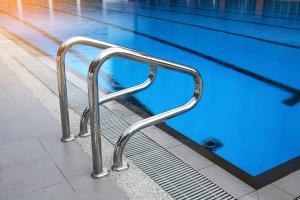Troubleshooting Low Flow: The Critical Role of Clean Baskets and Filters in Pool Health
When pumps struggle to move water, water chemistry becomes unbalanced, sanitation drops, and the entire system becomes more prone to issues that are costly to correct”
METAIRIE, LA, UNITED STATES, June 26, 2025 /EINPresswire.com/ -- Proper circulation remains essential for maintaining safe and healthy swimming pools. One of the most common yet underrecognized issues affecting circulation is low flow, which often results from clogged skimmer baskets and dirty filtration media. Left unaddressed, these conditions reduce water turnover, impair chemical distribution, and create ideal environments for algae and bacteria.— William Gunzburg
William Gunzburg, owner of Kingfish Pools Inc. in Metairie, Louisiana, highlights the importance of regular maintenance to prevent flow restrictions and preserve optimal pool conditions.
“Low circulation is more than a minor inconvenience,” said Gunzburg. “When pumps struggle to move water, water chemistry becomes unbalanced, sanitation drops, and the entire system becomes more prone to issues that are costly to correct.”
How Skimmer and Pump Baskets Influence Flow
Skimmer baskets catch surface debris before it enters the pump system. Objects like leaves, twigs, sunscreen residue, and insects can accumulate quickly, especially after storms or high-traffic usage. When baskets clog, pump suction decreases and basket overflow may occur. This not only limits circulation but also allows debris to pass into the pump and filter, increasing risk of damage or system failure.
Pump baskets act as a secondary barrier, capturing finer material not caught in the skimmer. These should be cleaned simultaneously. Built-up debris in the pump basket can starve the pump of water, leading to cavitation—a situation where air enters the system, creates dry running, and can damage impellers or seals.
Role of Filters in Maintaining Flow and Clarity
Pool filters—sand, cartridge, or diatomaceous earth (DE)—are designed to capture contaminants to a specific micron level. For sand filters, pressure gauges signal when a backwash is needed. Cartridge filters require visual inspection and rinsing or replacement when pressure increases by 8–10 psi above normal operating levels. DE filters must be cleaned thoroughly, and grids inspected for damage or tears.
Friction through a dirty filter places strain on the pump. Over time, this strain reduces flow, increases electricity consumption, and reduces the effectiveness of chlorine or other sanitizers.
Signs Low Flow Is Undermining Pool Health
Several indicators suggest low circulation is negatively affecting pool conditions:
Uneven chemical distribution: When chlorine cannot circulate properly, areas of the pool may display algae growth or cloudy water.
Visible debris: Leaves or pollen floating on the surface indicate that skimmers aren’t working efficiently to capture debris.
High filter pressure: Pressure readings climbing above 8–10 psi signal restricted flow. While backwashing may help momentarily, persistent elevation indicates a need for deeper cleaning or part replacement.
Pump noise or cavitation: A loud gurgling sound or fluctuating flow in the pump strainer suggests air entrainment due to low suction.
Increased energy costs: A pump under strain draws more current, pushing electricity usage higher without yielding improved results.
Easy Steps to Restore and Maintain Flow
Regular inspection and cleaning of baskets and filters can restore flow efficiency and avert larger problems:
Clean skimmer and pump baskets weekly, or as needed after heavy use or storms.
Backwash sand filters once pressure rises above the normal operating range or as specified by the manufacturer.
Rinse cartridge filters monthly or when pressure elevates significantly; replace cartridges per manufacturer intervals.
Clean DE grids and inspect for tears annually; ensure grid alignment and manifold condition.
Record static and functional pressure readings, enabling comparisons and trend monitoring.
Inspect were pool cover or vacuum plates might be blocked, obstructing water flow during winter covering or automated cleaning cycles.
Long-Term Consequences of Ignoring Low Flow
Persistent low circulation accelerates encryption of water chemistry and accelerates wear on equipment. Algae thrives in areas with insufficient sanitizer presence, leading to frequent shocking and costly chemical usage. Pumps running with restricted flow are more prone to overheating, impeller damage, and premature seal failure. Bacteria such as Pseudomonas and E. coli can proliferate when sanitizer levels cannot sustain throughout the water body.
Over time, ongoing low circulation can compromise pool finish materials. Deposits settle into plaster or tile grout, leading to staining and surface degradation. Drastic repairs—such as replastering or tile replacement—become necessary after years of neglect.
Preventative Care: Investment in Longevity
In pool systems, proper circulation equates to health and longevity. Clear water, balanced chemistry, and comfortable swim conditions are outcomes of accessible water flow and efficient filtration. Annual inspections by certified pool technicians can detect wear, identify cavitation, and ensure pumps and filters operate within recommended performance thresholds.
Maintenance Calendar Recommendation
Frequency Task
Weekly Skimmer and pump basket cleaning; surface debris check
Monthly Filter inspection; pressure gauge verification; suction check; hose or cover cleaning
Quarterly Cartridge rinsing/replacement; sand backwash; DE grid cleaning
Annually Professional equipment and plumbing inspection; seal checks; pressure test; pump lubrication
By consistently monitoring pressure, flow characteristics, and equipment condition, pool operators maintain effective turnover rates—typically one full circulation every 8–12 hours—fulfilling public health guidelines set for residential and commercial pools in Louisiana.
Kingfish Pools Inc. continues to support pool owners in the Metairie region by emphasizing flow management, filtration upkeep, and proactive equipment monitoring. Addressing low flow before it escalates can minimize downtime, protect warranties, and preserve the comfort value of recreational aquatics.
Morgan Thomas
Rhino Digital, LLC
+1 504-875-5036
email us here
Visit us on social media:
Facebook
Legal Disclaimer:
EIN Presswire provides this news content "as is" without warranty of any kind. We do not accept any responsibility or liability for the accuracy, content, images, videos, licenses, completeness, legality, or reliability of the information contained in this article. If you have any complaints or copyright issues related to this article, kindly contact the author above.


